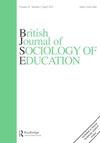‘I was worried I’d sound stupid’: institutional interactions and the impact on marginalised students’ university experiences
IF 2.1
3区 教育学
Q1 EDUCATION & EDUCATIONAL RESEARCH
引用次数: 0
Abstract
Abstract Applying a Bourdieusian lens, this study seeks to explore the interactions between secondary and higher education and how these interactions impact marginalised students in an elite university in China. It presents accounts of the educational experiences of 13 marginalised students of rural origin. The findings suggest that for them educational institutions function as the main field of inculcating capital and instilling habitus due to their families’ powerlessness to engage more deeply. When secondary schools and universities are consistent in terms of doxa, available capital and practices, marginalised students are more likely to undergo ‘fish-in-water’ experiences in the elite field, and a synergy is also more likely to occur between individual habitus and the field. Otherwise, the conflicts and incompatibility between different educational stages cause a visibly negative impact on them and lead to a difficult transition into university. This article argues for a better connection between secondary and higher education.“我担心自己听起来很傻”:机构互动以及对边缘化学生大学经历的影响
摘要运用布迪厄视角,本研究试图探索中等教育和高等教育之间的互动,以及这些互动如何影响中国精英大学中的边缘化学生。它介绍了13名农村出身的边缘化学生的教育经历。研究结果表明,对他们来说,教育机构是灌输资本和灌输习惯的主要领域,因为他们的家庭无力更深入地参与其中。当中学和大学在doxa、可用资本和实践方面保持一致时,边缘化的学生更有可能在精英领域经历“鱼与熊掌”的经历,个人习惯和领域之间也更有可能产生协同作用。否则,不同教育阶段之间的冲突和不相容会对他们产生明显的负面影响,并导致他们难以进入大学。本文主张在中等教育和高等教育之间建立更好的联系。
本文章由计算机程序翻译,如有差异,请以英文原文为准。
求助全文
约1分钟内获得全文
求助全文
来源期刊
CiteScore
3.70
自引率
9.50%
发文量
74
期刊介绍:
British Journal of Sociology of Education is one of the most renowned international scholarly journals in the field. The journal publishes high quality original, theoretically informed analyses of the relationship between education and society, and has an outstanding record of addressing major global debates about the social significance and impact of educational policy, provision, processes and practice in many countries around the world. The journal engages with a diverse range of contemporary and emergent social theories along with a wide range of methodological approaches. Articles investigate the discursive politics of education, social stratification and mobility, the social dimensions of all aspects of pedagogy and the curriculum, and the experiences of all those involved, from the most privileged to the most disadvantaged. The vitality of the journal is sustained by its commitment to offer independent, critical evaluations of the ways in which education interfaces with local, national, regional and global developments, contexts and agendas in all phases of formal and informal education. Contributions are expected to take into account the wide international readership of British Journal of Sociology of Education, and exhibit knowledge of previously published articles in the field. Submissions should be well located within sociological theory, and should not only be rigorous and reflexive methodologically, but also offer original insights to educational problems and or perspectives.

 求助内容:
求助内容: 应助结果提醒方式:
应助结果提醒方式:


